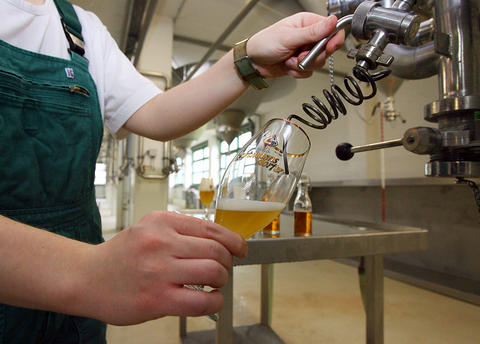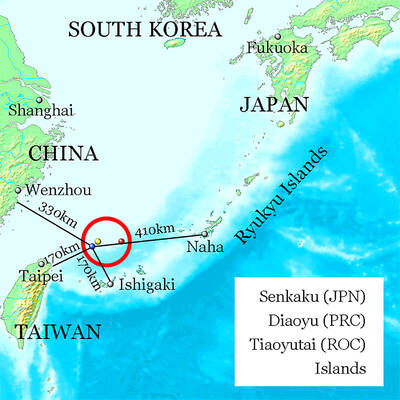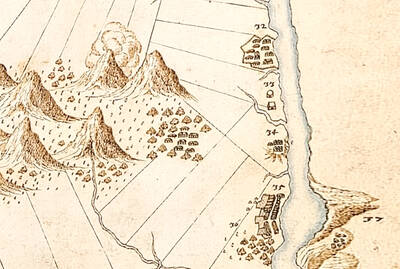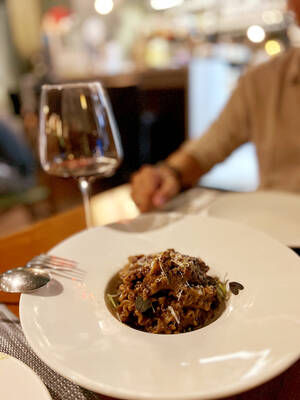Having tapped the local beer market for all it is worth, German brewers have begun making kosher beer for Jews and a halal, alcohol-free version for Muslims in a search for new clients.
In the land of Berliner Kindl, Beck's and Loewenbrau, the kosher version stands out with the name Simcha and a Star of David on its blue and gold label.
“The name means ‘joy' in Hebrew,” said Ludwig Hoernlein, a brewer in Hartmannsdorf in the east German state of Saxony, who is breaking into the Jewish market.

PHOTO: AFP
A certificate on the brewery wall, signed by Rabbi Yitshak Ehrenberg from Berlin, attests that the beer is produced in accordance with Judaic dietary rules but warns that it is not suitable for Passover.
“The whole production process is scrutinized from A to Z by a rabbi,” Hoernlein said.
He explained that Simcha, a white pilsner with its alcohol content of 4.9 percent, may not come into contact with a drop of beer produced the traditional German way.
A 30-tonne silo at the brewery is reserved exclusively for kosher grains.
The barley and hops are grown organically in Bavaria, the yeast used to ferment it is made at the brewery and the water comes from local springs.
In accordance with Jewish food rules, the barley may not have been grown during the Passover period and pregnant or menstruating women may not be involved in the production.
The brewery's stainless steel pipes have to be cleaned before the Simcha streams through them and the beer is bottled well apart from the others produced here.
The kosher certification comes at a high cost — Simcha is roughly 80 percent more expensive than the average German beer.
The brew was launched six months ago and Hoernlein said though demand has been strong, it is too soon to speak of a hit.
“We are still in the experimental stage.”
The first 100,000 liters were sold mainly to Jewish communities and kosher restaurants in Germany but Hartmannsdorf, a tiny brewery by German standards, has also received orders from Vienna, Belgium and Britain.
“We are also actively involved in negotiations in Israel with import-export people and a hotel chain there,” Hoernlein said proudly.
He said the beer is the cross-cultural brainchild of Jewish brothers by the name of Dziuballa who run a kosher restaurant in east German city of Chemnitz and Wilfried Gotter, a friend who runs an evangelical bookshop.
“It proves that beer brings people together,” Hoernlein said.
An even more ambitious project of making granules for just-add-water, alcohol-free beer for the Muslim market has its home in Freising in Bavaria.
It is made by GranMalt, a company founded just last year, and sells to soft-drink producers abroad who mix it with water and milk for their Muslim clients.
“Because of the saturation of the German market, we have begun making instant alcohol-free beer and selling it to exporters who serve mainly the Middle East,” said GranMalt director Claus Kuester.
“Since their religion forbids alcohol, Arab countries have hardly any breweries so we have decided to move in to fill the gap.”
GranMalt opted for granules because these are easier to export and less likely to spoil on the export voyage than a bottled beverage.
Drying the malt without losing the flavor and destabilizing the ingredients that produce beer's head of foam proved a challenge, but Kuester said a special evaporation process has done the trick.
The Muslim market is yet to deliver its verdict, but in the meantime the project has won Germany's Entrepreneur Prize.

Last week gave us the droll little comedy of People’s Republic of China’s (PRC) consul general in Osaka posting a threat on X in response to Japanese Prime Minister Sanae Takaichi saying to the Diet that a Chinese attack on Taiwan may be an “existential threat” to Japan. That would allow Japanese Self Defence Forces to respond militarily. The PRC representative then said that if a “filthy neck sticks itself in uninvited, we will cut it off without a moment’s hesitation. Are you prepared for that?” This was widely, and probably deliberately, construed as a threat to behead Takaichi, though it

Nov. 17 to Nov. 23 When Kanori Ino surveyed Taipei’s Indigenous settlements in 1896, he found a culture that was fading. Although there was still a “clear line of distinction” between the Ketagalan people and the neighboring Han settlers that had been arriving over the previous 200 years, the former had largely adopted the customs and language of the latter. “Fortunately, some elders still remember their past customs and language. But if we do not hurry and record them now, future researchers will have nothing left but to weep amid the ruins of Indigenous settlements,” he wrote in the Journal of

Even after years in business, weekend tables here can be booked out a month in advance. The price point far exceeds its competitors. Granted, expectations are soaringly high, but something here failed to hit the high notes. There are a few telltale signs that a restaurant relies solely on outstanding food to create the experience, no gimmicks or distractions needed. La Mole is such a restaurant. The atmosphere is food-forward, with an open kitchen center stage. Our tables are simple; no candles, no dim lighting, no ambient music. The menu is brief, and our waiter directs most

If China attacks, will Taiwanese be willing to fight? Analysts of certain types obsess over questions like this, especially military analysts and those with an ax to grind as to whether Taiwan is worth defending, or should be cut loose to appease Beijing. Fellow columnist Michael Turton in “Notes from Central Taiwan: Willing to fight for the homeland” (Nov. 6, page 12) provides a superb analysis of this topic, how it is used and manipulated to political ends and what the underlying data shows. The problem is that most analysis is centered around polling data, which as Turton observes, “many of these